浪漫主义文学之03英国浪漫主义诗歌
- 格式:ppt
- 大小:1.03 MB
- 文档页数:67
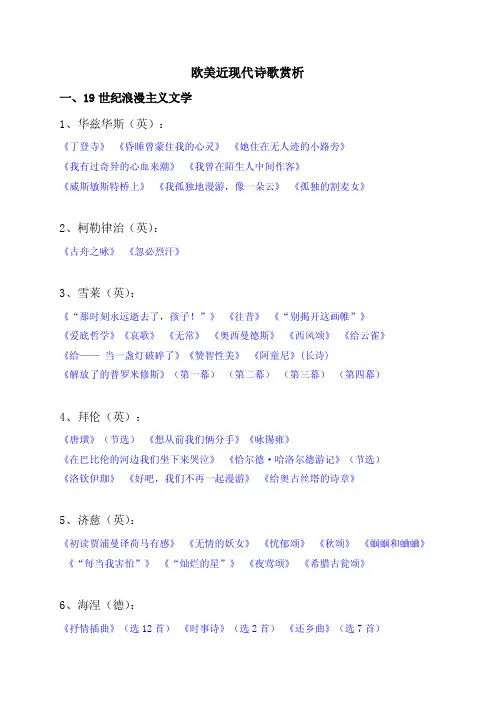
欧美近现代诗歌赏析一、19世纪浪漫主义文学1、华兹华斯(英):《丁登寺》《昏睡曾蒙住我的心灵》《她住在无人迹的小路旁》《我有过奇异的心血来潮》《我曾在陌生人中间作客》《威斯敏斯特桥上》《我孤独地漫游,像一朵云》《孤独的割麦女》2、柯勒律治(英):《古舟之咏》《忽必烈汗》3、雪莱(英):《“那时刻永远逝去了,孩子!”》《往昔》《“别揭开这画帷”》《爱底哲学》《哀歌》《无常》《奥西曼德斯》《西风颂》《给云雀》《给——当一盏灯破碎了》《赞智性美》《阿童尼》(长诗)《解放了的普罗米修斯》(第一幕)(第二幕)(第三幕)(第四幕)4、拜伦(英):《唐璜》(节选)《想从前我们俩分手》《咏锡雍》《在巴比伦的河边我们坐下来哭泣》《恰尔德·哈洛尔德游记》(节选)《洛钦伊珈》《好吧,我们不再一起漫游》《给奥古丝塔的诗章》5、济慈(英):《初读贾浦曼译荷马有感》《无情的妖女》《忧郁颂》《秋颂》《蝈蝈和蛐蛐》《“每当我害怕”》《“灿烂的星”》《夜莺颂》《希腊古瓮颂》6、海涅(德):《抒情插曲》(选12首)《时事诗》(选2首)《还乡曲》(选7首)7、普希金(俄):《致恰阿达耶夫》《致克恩》《纪念碑》《致大海》《欧根·奥涅金》节选、《巴奇萨拉的喷泉》8、惠特曼(美):《我听见美国在歌唱》《一只沉默而耐心的蜘蛛》《哦.船长,我的船长!》《我在路易斯安那看见一棵栎树在生长》《眼泪》《黑夜里在海滩上》《从滚滚的人海中一小时的狂热和喜悦》《我自己的歌》(节选)9、爱伦·坡(美):《致海伦》《安娜蓓尔·李》《最快乐的日子》《乌鸦》《梦》《模仿》《湖——致——》二、19世纪象征主义文学1、魏尔伦(法):《感伤的对话》《月光曲》《白色的月》《泪流在我心里》《狱中》《小夜曲》《秋歌》《多情的散步》《神秘之夜的黄昏》《夕阳》《苦恼》《我不知道为什么》《在你还没有消失……》2、波德莱尔(法):《应和》《从前的生活》《异域的芳香》《头发》《阳台》《黄昏的和谐》《秋歌》《猫》《风景》《赌博》《高翔远举》《人与海》《月亮的哀愁》《忧伤与漂泊》《秋之十四行诗》《毁灭》《祝福》3、马拉美(法):《太空》《夏愁》《天鹅》《叹息》《回春》《撞钟人》《牧神的午后》《海风》4、韩波(法):《醉舟》《黄昏》《元音》《奥菲利娅》《牧神的头》《乌鸦》《童年》三、19世纪批判现实主义文学1、裴多菲(匈牙利):《民族之歌》《自由与爱情》《我的泪》《雪地光滑,雪橇疾驶》《夜》《给茹日卡》《太阳的婚后生活》《我宁愿是》《我的心呀,你孤独的笼中鸟》《眼睛呀,你万能的眼》《落吧,落吧,落吧》《来吧,春天,来吧!》《谎言》《我枉然等待吗》《缝纫姑娘》《啊,你美丽的边疆姑娘》《你建造起我心灵的新世界》《我曾经在她身旁》《我的爱情在增长》《你不要判断》《你常常来到我的梦中》《风暴静息了》《永远没有那样的恋人》《每一朵花》《火》《我旅行在大草原上》《你嫁给我吗》《大海沸腾了》四、20世纪后期象征主义文学1、艾略特(英):《荒原》《烧毁的诺顿》《东科克》《干燥的萨尔维吉斯》《J·阿尔弗雷德·普罗弗洛克的情歌》《眼睛,我曾在最后一刻的泪光中看见你》《风在四点骤然刮起》《空心人》《小吉丁》2、叶芝(爱尔兰):《湖心岛茵尼斯弗利岛》《当你老了》《柯尔庄园的天鹅》《基督重临》《丽达与天鹅》《在本布尔山下》《一九一六年复活节》《思想的气球》《圣徒和驼子》《驶向拜占庭》《在学童中间》《旋转》《我的书本去的地方》《天青石雕》《他讲着绝伦的美》《那丧失的东西》《秘密的玫瑰》《另外的面孔》《寒冷的天穹》《词语》《长脚蚊》《白鸟》《致他的心,叫它别害怕》《箭》《印度人的恋歌》《随时间而来的真理》《一位友人的疾病》《人随岁月长进》3、庞德(美):《在地铁车站》《合同》《舞姿》《少女》《为选择墓地而作的颂诗》《普罗旺斯晨歌》《咏叹调》《白罂粟使者》《诗章第49号》《扇诗》五、20世纪现实主义文学1、马雅可夫斯基(俄):《晨》《致俄罗斯》《把未来揪出来!》《最好的诗》《赠耐特同志——船和人》《开会迷》2、叶赛宁(俄):《失去的东西永不复归》《拉起红色的手风琴》《再见吧,我的朋友,再见》《可爱的家乡啊》《我辞别了我出生的屋子》《我不叹惋、呼唤和哭泣》。
![[英国浪漫主义诗人]简析英国浪漫主义诗歌的主要特征49](https://uimg.taocdn.com/32faefd159f5f61fb7360b4c2e3f5727a5e92477.webp)
[英国浪漫主义诗人]简析英国浪漫主义诗歌的主要特征49篇一: 简析英国浪漫主义诗歌的主要特征49简析英国浪漫主义诗歌的主要特征张娜中国矿业大学外文学院09硕221116摘要:18、19世纪之交,浪漫主义诗学在德、英、法等西欧国家悄然兴起,沿袭了近三百年的新古典主义批评体系开始迅速解体。
毫无疑问,这是批评史上的一次重大转折,对此后西方诗学的发展产生了深远的影响。
关键词:浪漫主义;诗歌;自然;想象;功能引言18世纪末19世纪初,英国浪漫主义兴起。
英国的浪漫主义早期接受了德国浪漫派的影响,一反古典主义的理性统治,充满了消极感伤的情绪,主要以华兹华斯为首的湖畔派诗人为代表。
但随着产业革命的发展,消极和反动的倾向并没有持续成为浪漫主义的主流,而是被拜伦和雪莱为主导的一股积极进步,不甘妥协的力量所取代。
本文主要考察这一时期英国诗歌发展的主要特征,为更好的理解浪漫主义诗歌提供必要的理论依据。
在《文学传记》中,柯勒律治还提出了关于想象的一些主张。
他把想象分为第一性的和第二性的。
第一性的想象是人类感知所具有的活力和主要功能。
第二性的想象是第一性想象的回声,它能够溶化,扩散,分解,以便再创造。
柯勒律治还将想象和幻想进行了区分。
他认为想象是活的,其目的是为了再创造,而幻想恰恰相反,其性质是固定不变的,只能通过联想取得现成的素材。
想象对于诗人来说是最重要的,它无处不在,把一切形成一个优美而智慧的整体。
柯勒律治认为“一个灵魂中没有音乐的人”是绝不可能成为天才的诗人的。
但音乐的美感和给予这美感的能力是一、“讴歌自然的诗人” 华兹华斯由于浪漫主义诗人受到卢梭“返回自然”的影响,他们大多崇尚自然,主张回归自然,而且善于用最自然的诗歌语言描写自然。
诗论中自然观最为强烈的当属华兹华斯。
他以饱蘸感情的诗笔,讴歌大自然,咏赞自然界对人类心灵的影响,被雪莱誉为“讴歌自然的诗人”。
1798年,华兹华斯与柯勒律治合写了《抒情歌谣集》,阐述了他们的诗歌创作理论。
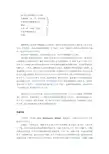
英国浪漫主义运动的开端,是以华兹华斯和柯勒律治在一七九八年出版的《抒情歌谣集》为标志的。
华兹华斯于一八OO年在诗集再版时撰写的《序言》,成为英国浪漫主义向古典主义宣战的一篇艺术纲领。
由于他们对古典主义传统法则的反抗,宣扬浪漫主义的艺术方法,故又将湖畔派诗人称为“浪漫派的反抗”。
华兹华斯华兹华斯(1770~1850)Wordsworth,William,英国诗人。
1770年4月7日生于北部昆布兰郡科克茅斯的一个律师之家,1850年4月23日卒于里多蒙特。
8岁丧母。
5年后,父亲又离开了他。
亲友送他到家乡附近的寄宿学校读书。
1787年进剑桥大学,曾在1790年、1791年两次访问法国。
其间与法国姑娘阿内特·瓦隆恋爱,生有一女。
1795年从一位朋友那里接受了一笔遗赠年金,他的生活有了保障,也有了实现回归大自然夙愿的可能,便同妹妹多萝西移居乡间。
1797年同诗人柯尔律治相识,翌年两人共同出版《抒情歌谣集》。
1798~1799年间与柯尔律治一同到德国游历,在那里创作了《采干果》、《露斯》和组诗《露西》,并开始创作自传体长诗《序曲》。
1802年与玛丽·哈钦森结婚。
此时开始关注人类精神在与大自然交流中得到的升华,并且发现这一主题与传统的宗教观实际上并行不悖,因此重新皈依宗教。
同时,在政治上日渐保守。
华兹华斯诗歌创作的黄金时期在1797~1807年。
随着声誉逐渐上升,他的创作逐渐走向衰退。
到了1830年,他的成就已得到普遍承认,1843年被封为英国桂冠诗人。
由于他与柯尔律治等诗人常居住在英国西北部多山的湖区,1807年10月的《爱丁堡评论》杂志称他们是湖畔派诗人。
早期诗歌《晚步》和《素描集》中,对大自然的描写基本上未超出18世纪的传统。
然而,从《抒情歌谣集》开始,一反18世纪的诗风,将一种崭新的风格带到诗歌创作中,开创了英国文学史上浪漫主义诗歌的新时代。
他为《抒情歌谣集》的再版所写的序言被认为是浪漫主义文学的宣言。
![《英国文学选读》浪漫主义诗歌名家译文[1]](https://uimg.taocdn.com/d2d33534a6c30c2258019e01.webp)
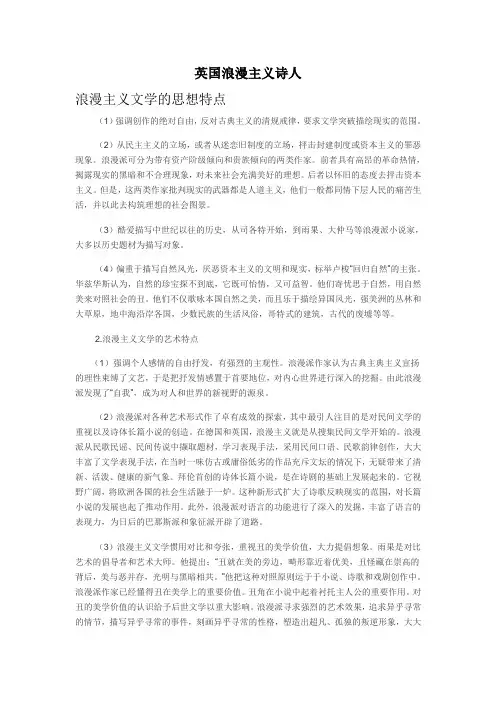
英国浪漫主义诗人浪漫主义文学的思想特点(1)强调创作的绝对自由,反对古典主义的清规戒律,要求文学突破描绘现实的范围。
(2)从民主主义的立场,或者从迷恋旧制度的立场,抨击封建制度或资本主义的罪恶现象。
浪漫派可分为带有资产阶级倾向和贵族倾向的两类作家。
前者具有高昂的革命热情,揭露现实的黑暗和不合理现象,对未来社会充满美好的理想。
后者以怀旧的态度去抨击资本主义。
但是,这两类作家批判现实的武器都是人道主义,他们一般都同情下层人民的痛苦生活,并以此去构筑理想的社会图景。
(3)酷爱描写中世纪以往的历史,从司各特开始,到雨果、大仲马等浪漫派小说家,大多以历史题材为描写对象。
(4)偏重于描写自然风光,厌恶资本主义的文明和现实,标举卢梭“回归自然”的主张。
华兹华斯认为,自然的珍宝探不到底,它既可怡情,又可益智。
他们寄忧思于自然,用自然美来对照社会的丑。
他们不仅歌咏本国自然之美,而且乐于描绘异国风光,强美洲的丛林和大草原,地中海沿岸各国,少数民族的生活风俗,哥特式的建筑,古代的废墟等等。
2.浪漫主义文学的艺术特点(1)强调个人感情的自由抒发,有强烈的主观性。
浪漫派作家认为古典主典主义宣扬的理性束缚了文艺,于是把抒发情感置于首要地位,对内心世界进行深入的挖掘。
由此浪漫派发现了“自我”,成为对人和世界的新视野的源泉。
(2)浪漫派对各种艺术形式作了卓有成效的探索,其中最引人注目的是对民间文学的重视以及诗体长篇小说的创造。
在德国和英国,浪漫主义就是从搜集民间文学开始的。
浪漫派从民歌民谣、民间传说中撷取题材,学习表现手法,采用民间口语、民歌韵律创作,大大丰富了文学表现手法,在当时一味仿古或庸俗低劣的作品充斥文坛的情况下,无疑带来了清新、活泼、健康的新气象。
拜伦首创的诗体长篇小说,是在诗剧的基础上发展起来的。
它视野广阔,将欧洲各国的社会生活融于一炉。
这种新形式扩大了诗歌反映现实的范围,对长篇小说的发展也起了推动作用。
此外,浪漫派对语言的功能进行了深入的发掘,丰富了语言的表现力,为日后的巴那斯派和象征派开辟了道路。

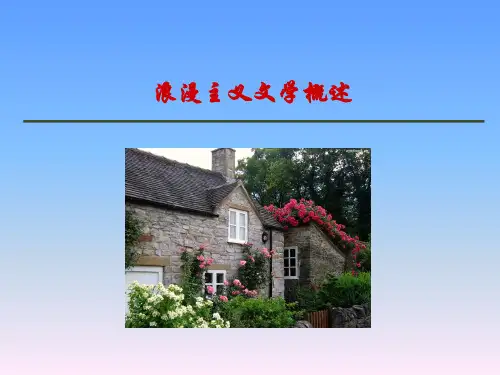

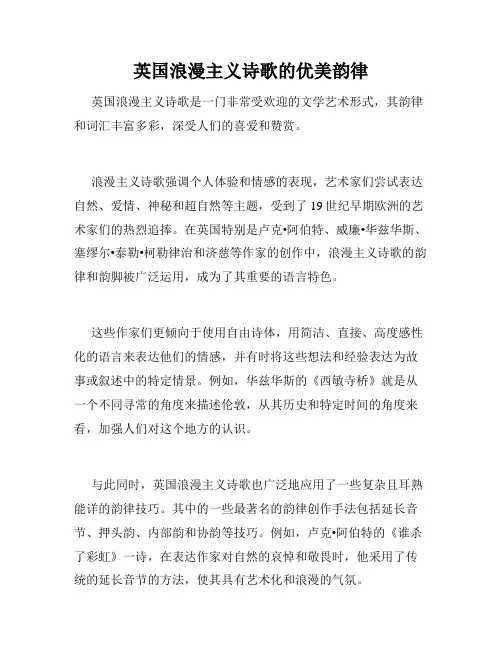
英国浪漫主义诗歌的优美韵律英国浪漫主义诗歌是一门非常受欢迎的文学艺术形式,其韵律和词汇丰富多彩,深受人们的喜爱和赞赏。
浪漫主义诗歌强调个人体验和情感的表现,艺术家们尝试表达自然、爱情、神秘和超自然等主题,受到了19世纪早期欧洲的艺术家们的热烈追捧。
在英国特别是卢克•阿伯特、威廉•华兹华斯、塞缪尔•泰勒•柯勒律治和济慈等作家的创作中,浪漫主义诗歌的韵律和韵脚被广泛运用,成为了其重要的语言特色。
这些作家们更倾向于使用自由诗体,用简洁、直接、高度感性化的语言来表达他们的情感,并有时将这些想法和经验表达为故事或叙述中的特定情景。
例如,华兹华斯的《西敏寺桥》就是从一个不同寻常的角度来描述伦敦,从其历史和特定时间的角度来看,加强人们对这个地方的认识。
与此同时,英国浪漫主义诗歌也广泛地应用了一些复杂且耳熟能详的韵律技巧。
其中的一些最著名的韵律创作手法包括延长音节、押头韵、内部韵和协韵等技巧。
例如,卢克•阿伯特的《谁杀了彩虹》一诗,在表达作家对自然的哀悼和敬畏时,他采用了传统的延长音节的方法,使其具有艺术化和浪漫的气氛。
此外,英国浪漫主义诗歌的韵律也会参考其他体裁,如诗歌、
戏剧、民谣、史诗和传说等,以营造出各种不同的情感、场景和
语言情境。
例如,柯勒律治的《古老水族馆》就使用了像史诗般
的语言,将人们带入一个神秘而魔幻的位置,充满了魔力和神秘感。
总体来说,英国浪漫主义诗歌的韵律和特定词汇的使用是其深
受欢迎和广泛赞赏的原因之一。
诗歌的结构和韵律,非常准确地
体现了诗歌的表达,营造出了各种不同的情感和场景。
纵观历史,这些浪漫主义的作家对于英国文化的推动和发展,作出了极其重
要的贡献。
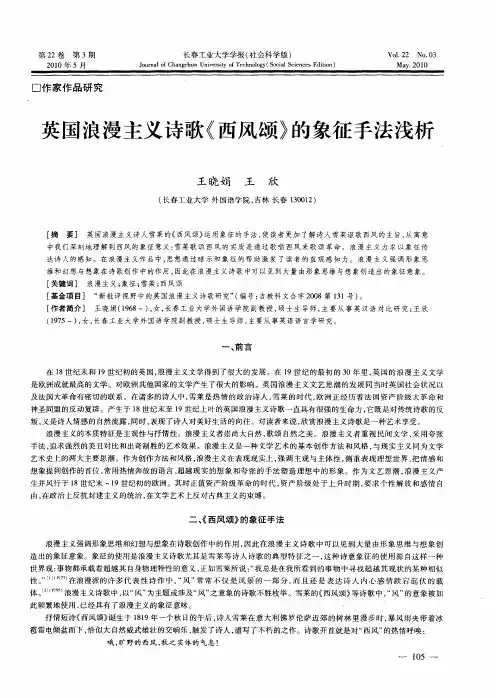
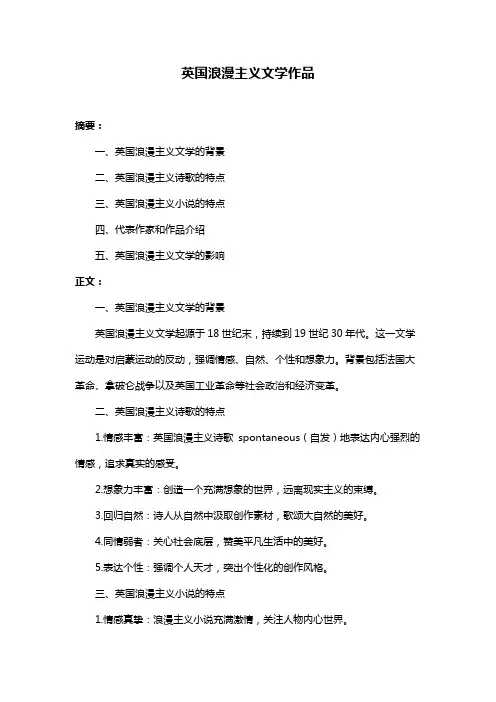
英国浪漫主义文学作品摘要:一、英国浪漫主义文学的背景二、英国浪漫主义诗歌的特点三、英国浪漫主义小说的特点四、代表作家和作品介绍五、英国浪漫主义文学的影响正文:一、英国浪漫主义文学的背景英国浪漫主义文学起源于18世纪末,持续到19世纪30年代。
这一文学运动是对启蒙运动的反动,强调情感、自然、个性和想象力。
背景包括法国大革命、拿破仑战争以及英国工业革命等社会政治和经济变革。
二、英国浪漫主义诗歌的特点1.情感丰富:英国浪漫主义诗歌spontaneous(自发)地表达内心强烈的情感,追求真实的感受。
2.想象力丰富:创造一个充满想象的世界,远离现实主义的束缚。
3.回归自然:诗人从自然中汲取创作素材,歌颂大自然的美好。
4.同情弱者:关心社会底层,赞美平凡生活中的美好。
5.表达个性:强调个人天才,突出个性化的创作风格。
三、英国浪漫主义小说的特点1.情感真挚:浪漫主义小说充满激情,关注人物内心世界。
2.想象丰富:创造独特的虚构世界,展现丰富的想象力。
3.自然主义:小说中的人物和场景紧密联系自然,体现人与自然的和谐。
4.关注社会:揭示社会不公,关注普通人的生活和命运。
5.人物塑造:塑造鲜明的人物形象,突出个性特点。
四、代表作家和作品介绍1.威廉·华兹华斯:《抒情歌谣集》、《序曲》2.萨缪尔·泰勒·柯勒律治:《古舟子咏》、《Kubla Khan 》3.乔治·戈登·拜伦:《唐璜》、《恰尔德·哈洛德游记》4.约翰·基茨:《夜莺颂》、《希腊古瓮颂》5.简·奥斯汀:《傲慢与偏见》、《理智与情感》6.沃尔特·司各特:《艾凡赫》、《罗布·罗伊》五、英国浪漫主义文学的影响1.影响了后世文学创作,为现实主义文学奠定基础。
2.推动了文学形式的创新,如叙事诗、小说等。
3.传播了民主、自由的思想,对社会产生深远影响。
4.丰富了人类文化宝库,提供了珍贵的文学遗产。
简述英国浪漫主义诗歌的发展历程18世纪末19世纪初,英国浪漫主义文学得到很大发展。
在19世纪前30年,英国的浪漫主义文学是欧洲成就最高的文学,对欧洲其他国家的文学产生了很大影响。
英国浪漫主义诗歌的发展历程具体表现为:(1)英国浪漫主义先驱——彭斯和布莱克彭斯从苏格兰民歌中吸取养料,长于抒情和讽刺。
其代表作《苏格兰方言诗集》,揭露贵族的贪婪,赞美农民的纯朴,风格清新刚健,语言通俗,达到了18世纪英国诗歌的高峰。
布莱克运用清新的民歌体和奔放的无韵体写诗,具有象征意义和神秘色彩。
其代表作是《四天神》。
(2)英国第一代浪漫主义诗人——“湖畔派”诗人群“湖畔派”三诗人是华兹华斯、柯勒律治和骚塞。
他们对资本主义文明及人与人之间的现金交易关系极为反感。
他们的诗作或讴歌宗法式的农村生活和自然风景,或描写奇异神秘的故事和异国风光。
他们常常是通过缅怀中古时代的“纯朴”来否定丑恶的城市文明。
华兹华斯的《抒情歌谣集》序言是英国浪漫主义的宣言,华兹华斯提出诗是“强烈感情的自然流露”。
他特别强调诗人在“选择普通生活里的事件和情境”时,要给它们以想象力的色泽,使得平常的东西能以不寻常的方式出现于心灵之前”。
华兹华斯强调写“微贱的田园生活”,主张用民间的纯朴语言写诗人的真实感受。
华兹华斯关于诗歌改革的主张以及他的创作实践结束了英国古典主义诗学的统治,有力地推动了英国诗歌的革新和浪漫主义运动的发展。
(3)英国第二代浪漫主义诗人——拜伦、雪莱和济慈这三位诗人与“湖畔派”诗人不同,他们始终忠于法国革命理想,反对专*制暴*政,同情人民苦难,支持各国人民的民族解放运动,具有鲜明的资产阶级民主主义倾向。
拜伦在“东方叙事诗”中塑造了一系列“拜伦式英雄”,其《唐·璜》更因其思想艺术上的突出成就而成为世界不朽的名著。
雪莱的诗剧《解放了的普罗米修斯》气势磅礴,富有感染力。
其《西风颂》、《致云雀》等抒情诗歌,音韵铿锵,感情真挚,闪耀着深邃思想的光辉。
Chapter 3 The Romantic Period1. The Romantic Period: The Romantic period is the period generally said to have begun in 1798 with the publication of Wordsworth and Coleridge’s Lyrical Ballads and to have ended in 1832 with Sir Walter Scott’s death and the passage of the first Reform Bill in the Parliament. It is emphasized the special qualities of each individual’s mind.2.Social background:a. during this period, England itself had experienced profound economic and social changes. The primarily agricultural society had been replaced by a modern industrialized one.b. With the British Industrial Revolution coming into its full swing, the capitalist class came to dominate not only the means of production, but also trade and world market.3.The Romantic Movement: it expressed a more or less negative attitude toward the existing social and political conditions that came with industrialization and the growing importance of the bourgeoise. The romantics demontrated a a strong reaction against the dominant modes of thinking of the 18th-century writers and philosophers. They saw man as an individual in the solitary state. Thus, the Romanticism actually constitutes a change of direction from the outer world of social civilization to the inner world of the human spirit.The Romantic period is an age of poetry. Blake, Wordsworth, Coleridge, Byron, Shelley and Keats are the major Romantic poets. They started a rebellion against the neoclassical literature, which was later regarded as the poetic revolution. Wordsworth and Coleridge were the major representatives of this movement. Wordsworth defines the poet as a “man speaking to men”, and poetry as “the spontaneous overflow of powerful feelings.” Imagination, defined by Coleridge, is the vital faculty that creates new wholes out of disparate elements. The Romantics not only extol the faculty of imamgination, but also elevate the concepts of spontaneity and inspiration, regarding them as something crucial for true poetry. The natural world comes to the forefront of the poetic imagination. Nature is not only the major source of the poetic imagery, but also provides the dominant subject mattre. It is in solitude, in communion with the natural universe, that man can exercise this most valuable of faculties.Romantics also tend to be nationalistic, defending the great poets and dramatists of their own national heritage against the advocates of classical rules.Poetry: to the Romantics, poetry should be free from all rules.they would turn to the humble people and the common everyday life for subjects.Prose: It’s also a great age of prose. With education greatly developed for the middle-class people, there was a rapid growth in the reading public and an increasing demand for reading materials.Romantics made literary comments on the writers with high standards, which paved the way for the development of a new and valuable type of critical writings. Colerige, Hazlitt, Lamb, and De Quincey were the leading figures in this new development.Novel: the 2 major novelists of the period are Jane Austen and Walter Scott.Gothic novel: a tyoe of romantic fiction that predominated in the late 18th century, was one of the Romantic movement. Its principal elements are violence, horror, and the supernatural, which strongly appeal to the reader’s emotion. With is description of the dark, irritional side of human nature, the Gothic form exerted a great influence over the writers of the Romantic period.3. Ballads: the most important form of popular literature; flourished during the 15th century; Most written down in 18th century; mostly written in quatrains; Most important is the Robin Hood ballads.4. Romanticism: it is romanticism is a literary trend. It prevailed in England during the period of 1798-1832. Romanticists were discontent with and opposed to the development of capitalism. They split into two groups.Some Romantic writers reflected the thinking of those classes which had been ruined by the bourgeoisie called Passive Romantic poets represented by Wordsworth, Coleridge and Southey.Others expressed the aspiration of the labouring classes called Active or Revolutionary Romantic poets represented by Byron and Shelley and Keats.5. Lake Poets:Wordsworth, Coleridge and Robert Southey have often been mentioned as the “Lake Poets” because they lived in the Lake District in the northwestern part of England6. Byronic Hero a proud, mysterious rebelling figure of noble origin rights all the wrongs in a corrupt society, and is against any kind of tyrannical rules; It appeared first in Childe H arold’s Pilgrimage and then further developed in later works as the Oriental Tales, Manfred and Don Juan; the figure is somewhat modeled on the life and personality of Byron himself, and makes Byron famous both at home and abroad.7. Main Writers:A. William Blake(1757-1827):1. Literarily, Blake was the first important Romantic poet, showing a comtempt for the rule of reason, opposing the calssical tradition of the 18th century,and treasuring the individual’s imagination.2. His first printed work, Poetic Skelches, is a collection of youthful verse. Joy, laughter, love and harmony are the prevailing notes.3. The Songs of Innocence is a lovely volume of of poems, presenting a happy and innocent world, though not without its evils and sufferings. The wretched child described in “The Chimney Sweeper,”orphaned, exploited, yet touched by visionary rapture, evokes unbearable poignancy when he finally puts his trust in the order of the universe as he knows it. Blake experimented in meter and rhyme and introduced bold metrical innovations which could not be found in the poetry of his contemporaries.4. The Songs of Experience paints a different world, a world of misery, poverty, disease, war and repression with a malancholy tone. The little chinmney sweeper sings “notes of woe” while his parents go to the church and praise “God & his Priest & King”—the very intrument of their repression. A number of poems in the Songs of Experience also find a counterpart in the Songs of Experience. The 2 books hold the similar subject-matter, but the tone, emphasis and conclusion differ.5. Childhood is central to Blake’s concern in the Songs of Innocence and the Songs of Experience, and this concern gives the 2 books a strong social and historical reference. The two “Chimney Sweeper”poems are good examples to reveal the relation between an economic ciecumstance, i.e. the exploitation of child labor, and an ideological circumstance, i.e. the role played by religion in making people compliant to exploitation. The poem from the Songs of Innocence indicates the conditions which make religion a consolation, a prospect “illusionary happiness;”the poem from the Songs of Experience reveals the nature of religion which helps bring misery to the poor children.6. Blake’s Marriage of Heaven and Hell marks his entry into maturity. The poem plays the double role both as a satire and a revolutionary prophecy. Blake explores the relationship of the contrries. Attraction and repulsion, reason and energy, love and hate, are necessary to human existence. The “Marriage”means the reconciliation of the contraries, not the subordination of the one to the other.Main works: Poetical SketchesSongs of Innocence is a lovely volume of poemsHoly Thursday reminds us terribly of a world of loss and institutional cruelty.Songs of Experience paints a different world, a world of misery, poverty, disease, war and repression with a melancholy tone.Marriage of Heaven and HellThe book of UrizenThe Book of LosThe Four ZoasMilton7. Language Character: he writes his poems in plain and direct language. His poems often carry the lyric beauty with immense compression of meaning. He distrusts the abstractness and tends to embody his views with visual images. Symbolism in wide range is also a distinctive feature of his poetry.B. William Wordsworth(1770-1850) In 1842 he received a government pension, and in the following year he succeeded Southey as Poet Laureate.Lyrical Ballads:But the Lyrical Ballads differs in marked ways from his early poetry, notably the uncompromising simplicity of much of the language, the strong sympathy not merely with the poor in general but with particular, dramatized examples of them, and the fusion of natural description with expressions of inward states of mind.Short poems:According to the subjects, Wordsworth’s short poems can be calssified into two groups: poems about nature and poems about human life.Wordsworth is regarde as a “worshipper of nature.”He can penetrate to the heart of things and give the reader the very life of nature. “I Wandered Lonely as a Cloud”is perhaps the most anthologized poem in english literature, and one that takes us to the core of Wordsworth’s poetic beliefs. It’s nature that gives him “strength and knowledge full of peace.”Wordswoth thinks that common life is the only subject of literary interest. The joys and sorrows of the common people are his themes. “The Solitary Reaper” and “To a Highland Girl” use rural figures to suggest the timeless mystery of sorrowful humanity and its radiant beauty. In its daring use of subject matter and sense of the authenticity of the experience of the poorest, “Resolution and Independence ” is the triumphant conclusion of ideas first developed in the Lyrical Ballads.Wordsworth is a poet in memory of the past. To him, life is a cyclical journey. Its beginning finally turns out to be its end. His philosophy of life is presented in his masterpiece The Prelude.Wordsworth deliberate simplicity and refusal to decorate the truth of experience produced a kind of pure and profoud poetry which no othr poet has ever equaled. He maintained that the scenes and events of everyday life and the speech of ordinary people were the raw material of which poetry could and should be made.Main Works:Descriptive Sketches, and Evening WalkLyrical Ballads.The PreludePoems in Two VolumesOde: Intimations of ImmortalityResolution and Independence.The ExcursionPoets: The Sparrow’s Nest, To a Skylark, To the Cuckoo, To a Butterfly, I Wandered Lonely as a Cloud( is perhaps the most anthologized poem in English literature.), An Evening Walk, My Heart Leaps up, Tintern AbbeyThe ThornThe sailor’s motherMichael,The Affliction of MargaretThe Old Cumberland BeggarLucy PoemsThe Idiot BoyMan, the heart of man, and human life.The Solitary ReaperTo a Highland GirlThe Ruined CottageThe PreludeLanguage character: he can penetrate to the heart of things and give the reader the very life of nature. And he thinks that common life is the only subject of literary interest. The joys and sorrows of the common people are his themes. His sympathy always goes to the suffering poor.He is the leading figure of the English romantic poetry, the focal poetic voice of the period. His is a voice of searchingly comprehensive humanity and one that inspires his audience to see the world freshly, sympathetically and naturally. The most important contribution he has made is that he has not only started the modern poetry, the poetry of the growing inner self, but also changed the course of English poetry by using ordinary speech of the language and by advocating a return to natureC. Percy Bysshe Shelley(1792-1822)he grew up with violent revolutionary ideas, so he held a lifelong aversion to crulty, injusticce, authority, institutional religion and the formal shams of respectable society, condemming war, tyranny and exploitation. He realized that the evil was also in man’s mind. Even after a revolution, that is after the restoration of human morality and creativity, the evil deep in man’s heart might again be loosed. So he predicated that only through gradual and suitable reforms of the existing institutions couls benevolence be universally established and none of the evils would survive in this “genuin society,”where people could live together happily, freely and peacefully.Shelley expressed his love of freedom and his hatredtoward tyranny in several of his lyrics. One of the greatest political lyrics is “Men of England.” It is not only a war cry calling upon all working people to risse up against their political oppressors, but an address to them pointing out the intolerable injustice of economic exploitation. The poem was later to become a rallying song of the British Comuunist Party.Best of all the well-known lyric pieces is Shelley’s “Ode to the West Wind” here Shelley’s rhapsodic and declamatory tendencies find a subject perfectly suited to them. The autumn wind, burying the dead year, preparing for a new spring, becoms an image of Shelley himself, as he would want to be, in its freedom, its destructive-constructive potential, its universality. The whole poem had a logic of feeling,a not easily analyzable progression that leads to the triumphant, hopeful and convincing conclusion: if winter comes, can spring be far behind?Shelley’s greatest achievement is his four-act poetic drama, Prometheus Unbound. The play is an exultant work in praise of humankind’s potential, and Shelley himself recognized it as “the most perfect of my products.”Main works:The Necessity of Atheism, Queen Mab: a Philosophical Poem, Alastor, or The Spirit of SolitudePoem: Hymn to Intellectual Beauty, Mont BlancJulian and Maddalo, The Revolt of Islam, the Cenci, Prometheus Unbound, Adonais, Hellas,Prose: Defence of PoetryLyrics:genuine society,“Ode to Liberty”,“Old to Naples”“Sonnet: England in 1819”, The Cloud, To a Shylark, Ode to the West WindPolitical lyrics: Men of EnglandElegy: Adonais is a elegy for John Keats’s early deathTerza rimaPersonal Characters: he grew up with violent revolutionary ideas under the influence of the free thinkers like Hume and Godwin, so he held a life long aversion to cruelty, injustice, authority, institutional religion andthe formal shams of respectable society, condemning war, tyranny and exploitation. He expressed his love for freedom and his hatred toward tyranny in several of his lyrics such as “Ode to Liberty”,“Old to Naples”“Sonnet: England in 1819”Shelley is one of the leading Romantic poets, and intense and original lyrical poet in the English language. Like Blake, he has a reputation as a difficult poet: erudite, imagistically complex, full of classical and mythological allusions. His style abounds in personification and metaphor and other figures of speech which describe vividly what we see and feel. Or express what passionately moves us.D: Jane Austen(1755-1817): born in a country clergyman’s family:Main Works:Novel: Sense and SensibilityPride and Prejudice(the most popular)Northanger AbbeyMansfield ParkEmmaPersuasionThe WatsonsFragment of a NovelPlan of a NovelPersonal Characters: she holds the ideals of the landlord class in politics, religion and moral principles; and her works show clearly her firm belief in the predominance of reason over passion, the sense of responsibility, good manners and clear—sighted judgment over the Romantic tendencies of emotion and individuality.Her Works’ Characters: his works’s concern is about human beings in their personal relationships. Because of this, her novels have a universal significance. It is her c onviction that a man’s relationship to his wife and children is at least as important a part of his life as his concerns about his belief and career. Her thought is that if one wants to know about a man’s talents, one should see him at work, but if one wan ts to know about his nature and temper, one should see him at home. Austen shows a human being not at moments of crisis, but in the most trivial incidents of everyday life. She write within a very narrow sphere. The subject matter, the character range, the social setting, and plots are all restricted to the provincial life of the late 18th century England. Concerning three or four landed gentry families with their daily routine life.Her novels’ structure is exquisitely deft, the characterization in the hig hest degree memorable, while the irony has a radiant shrewdness unmatched elsewhere. Her works’ at one delightful and profound, are among the supreme achievements of English literature. With trenchant observation and in meticulous details, she presents the quiet, day-to-day country life of the upper-middle-class English.G: Questions and answers:1. what are the characteristics of the Romantic literature? Please discuss the above question in relation to one or two examples.a. in poetry writing, the romanticists employed new theories and innovated new techniques, for example, the preface to the second edition of the Lyrical Ballads acts as a manifesto for the new school.b. the romanticists not only extol the faculty of imagination, but also elevate the concepts of spontaneity and inspiration.c. they regarded nature as the major source of poetic imagery and the dominant subject.d. romantics also tend to be nationalistic.2.Make a contrast between the two generations of Romantic poets during the Romantic AgeThe poetic ideals announced by Wordsworth and Coleridge provided a major inspiration for the brilliant young writers who made up the second generation of English Romantic poets. Wordsworth and Coleridge both became more conservative politically after the democratic idealism. The second generation of Romantic poets are revolutionary in thinking. They set themselves against the bourgeois society and the ruling class.3.what are Austen’s writing features?Jane Austen is one of the realistic novelists. Aust en’s work has a very narrow literary field. Her novels showa wealth of humor, wit and delicate satire.4. what is the historical and cultural background of English Romanticism?a. Historically, it was provoked by the French Revolution and the English Industrial Revolution.b. Culturally, the publication of French philosopher Rousseau’s two books provided necessary guiding principles for the French Revolution which aroused great sympathy and enthusiasm in England;c. England experienced profound economic and social changes: the enclosure movement and the agricultural mechanization; the capitalist class grasped the political power and came to dominate the English society.H. topic discussion:1. Discuss the artistic features of Shelley’s poems.A. Percy Bysshe Shelly is an intense and original lyrical poet in the English language.B. His poems are full of classical and mythological allusions.C. His style abounds in personification and metaphor and other figures of speechD. He describes vividly what we see and feel, or expresses what passionately moves us.2. What does Wordsworth mean when he said “All good poetry is the spontaneous overflow of powerful feelings recollected in tranquility”?This sentence is considered as the principle of Wordsworth’s poetry c reation which was set forth in the preface to the Lyrical Ballads. Wordsworth appealed directly on individual sensations, as the foundation in the creation and appreciation of poetry.3. How do you describe the writing style of Jane Austen? What is the significance of her works?Jane Austen is a writer of the 18th century through she lived mainly in the 19th century. She holds the ideals of the landlord class in politics, religion, and moral principles. Austen’s main literary concern is about human beings in their personal relationships. Austen defined her stories within a very narrow sphere.。
英国浪漫主义诗歌创作解读
英国浪漫主义诗歌,在西方文学史上独树一帜,是一种容许作者在探索自我情感的过程中发挥自由想象的抒情诗,其特征是超越现实的幻灭,颠覆传统的和谐叙事,倡导批判的思维和深刻的存在主义思考。
英国浪漫主义诗歌潮流由浪漫主义早期大师拉尔夫.勃朗宁、格瑞格.布尔沃克、威廉.布莱克、华兹华斯及巴罗,以及后期代表诗人肯尼迪.柯林斯、司各特.米勒拉等人代表,从1798年兴起,直至1830年消退。
英国浪漫主义诗歌崇尚自然,旨在探究现实外的另一种存在形态。
它把神话、传说以及古老神秘的自然传奇景观揉合在一起,向外展开,表现出诗人的情感。
更显着的是,浪漫诗的抒情风格,比现代文学中的抒情风格更贴近自然,对艺术的反思更深刻。
英国浪漫主义诗歌的作者特别崇尚自由思想,追求超越传统体系的封建社会的虚无主义,可以说是英国文化叛逆派的最畅销品牌。
它最明显的特点是思维自主、调动读者的激情及誓死抵抗秩序的理念。
诗歌所描写的大气,更特别地揭示了无神论和激进行为的精神准备。
此外,现实和虚幻、理性与感性的交互并存也极大地促进了英国浪漫主义诗歌的诞生,因而使作品更加精彩深厚,诗句更加持续。
英国浪漫主义诗歌充满着浪漫情怀,以自由、独立、反叛为一个主题,唤醒诗人深层次的情感与敏感,带着那笼罩着梦幻、落寞而富于美感的语言,不仅塑造了引人注目的视角,而且让人心灵深处受到深深的触动。
因此,浪漫主义诗歌有着极为深远的影响,它在内心深处播下开放的种子,让文学迈向下一代,成为一种流派,而英国浪漫主义诗歌更是其中的点睛之作。
PART FIVE ROMANTICISM IN ENGLAND1.The Romantic Period浪漫主义时期At the turn of the 18th and 19th centuries romanticism appeared. It rose and grew under the impetus of the Industrial Revolution and French Revolution.18世纪末19世纪初,在英国工业革命和法国大革命的影响下,浪漫主义应运而生。
2.William Wordsworth威廉·华兹华斯The Prelude《序曲》Lyrical Ballads《抒情歌谣集》(与柯勒律治合著)3.Samuel Taylor Coleridge塞缪尔·泰勒·柯勒律治The Rime of the Ancient Mariner《古舟子咏》Kubla Khan《忽必烈汗》Robert Southey罗伯特·骚塞Thalaba the Destroyer《毁灭者撒拉巴》4.George Gordon Byron乔治·戈登·拜伦Childe Harold’s Pilgrimage《恰尔德·哈罗德游记》Don Juan《唐璜》5.Percy Bysshe Shelley波西·比西·雪莱Queen Mab《麦布女王》The Revolt of Islam《伊斯兰起义》Prometheus Unbound《解放了的普罗米修斯》The Masque of Anarchy《专制者的假面游行》Ode to the West Wind《西风颂》6.Jone Keats约翰·济慈Endymion《恩底弥昂》mb兰姆8.Hazlitt and Leigh Hunt哈兹里特和利·亨特9.De Quincey德昆西10.Scott司各特Minstrelsy of the Scottish Border《苏格兰边区歌谣集》Ivanhoe《艾凡赫》。
文学艺术:浪漫主义文学的代表作品引言浪漫主义文学是19世纪早期欧洲文学的一种重要流派,它强调个人感受、情感表达和对自然、想象力以及个体自由的追求。
本文将介绍几部具有代表性的浪漫主义文学作品,探讨其特点和对后世的影响。
1.《诗经》虽然《诗经》属于古代中国文学,但它在浪漫主义文学中占据重要地位。
这部集合了唐代以前各个时期的诗歌作品被视为中国最早的诗歌总集,其中包含了大量关于自然、爱情、悲伤等主题的抒发。
浪漫主义强调个人情感体验,而《诗经》中的众多诗歌正展示了原始民间诗歌创作时代的数量与多样性。
2.《简·爱》(Jane Eyre)这是英国女作家夏洛蒂·勃朗特于1847年匿名出版的一部长篇小说。
小说以女主角简·爱为中心,通过她坚韧不拔的个性与顽强的追求自由与独立的精神,展现了浪漫主义情感、对爱情和道德价值观的追寻。
小说中充满了对自然景色和内心世界的描绘,表达了对浪漫主义所代表的人类情感力量的渴望。
3.《悲惨世界》(Les Misérables)这是法国作家维克多·雨果于1862年出版的一部长篇小说。
故事背景设定在19世纪法国革命期间,在战争、贫困和社会不公中展现了各种人物形象及其命运。
《悲惨世界》以超凡的想象力和深邃的哲理思考,反映了社会角色之间的冲突、个体英雄主义以及希望与绝望之间永恒而复杂的关系。
这部作品被誉为浪漫主义文学中最具启发性和震撼力的代表之一。
4.《羊脂球》这是法国浪漫主义文学家卢梭于1762年出版的一部政治哲学著作。
卢梭通过羊脂球的寓言,表达了对人类自由与平等的追求,并批判当时法国社会的不公与专制。
这部作品在当时引起了极大的争议,成为后世思想家和革命者们推动社会变革的重要理论基础。
结束语以上介绍了几部浪漫主义文学的代表作品,其中包含了不同地域和时间背景下的作品。
这些作品以情感、个性及对自由、爱情和社会正义的追求为核心,反映了浪漫主义文学特有的情感体验和审美概念。
英国文学史复习资料一、早期文学1、凯尔特文学:凯尔特人是英国最早的民族,他们有自己的语言和神话传说。
他们的文学作品包括《德鲁伊特教义》和《芬尼亚传奇》。
2、盎格鲁-撒克逊文学:随着罗马帝国的衰落,日耳曼部落开始在英国定居。
盎格鲁-撒克逊时期最著名的文学作品是《贝奥武夫》,讲述了一位英勇的武士贝奥武夫的故事。
二、中世纪文学1、英雄史诗:中世纪时期,英国出现了许多描写骑士和英雄事迹的史诗,如《罗兰之歌》、《希尔德布兰德之歌》等。
2、骑士文学:随着封建制度的发展,骑士成为英国社会的一个重要阶层。
骑士文学主要描写骑士的冒险经历和爱情故事,如《亚瑟王传奇》等。
3、宗教文学:中世纪时期,英国的宗教文学也很发达。
最有名的作品是《神曲》和《圣经》的英译本。
三、文艺复兴时期文学1、伊丽莎白时代文学:伊丽莎白一世时期,英国进入了文艺复兴时期。
这个时期的文学作品包括莎士比亚的戏剧、《罗密欧与朱丽叶》等。
2、斯图亚特王朝复辟时期文学:斯图亚特王朝复辟后,英国文学开始向古典主义转变。
这个时期的文学作品包括弥尔顿的《失乐园》和约翰·德莱顿的诗歌等。
四、启蒙时期文学1、启蒙运动:启蒙运动是18世纪欧洲的一个思想解放运动,旨在推翻封建制度,建立资产阶级民主制度。
英国的启蒙运动以洛克和休谟为代表。
2、现实主义小说:随着工业革命的兴起,英国的现实主义小说开始兴起。
这个时期的代表作家包括狄更斯、萨克雷、勃朗特姐妹等。
他们的作品主要描写社会底层人民的生活和资产阶级的虚伪与贪婪。
3、浪漫主义诗歌:19世纪初,英国的浪漫主义诗歌开始兴起。
这个时期的代表诗人包括华兹华斯、柯勒律治和拜伦等。
他们的作品主要表达个人情感和对自然的向往。
五、维多利亚时期文学1、维多利亚时代的社会背景:维多利亚时代是英国的一个繁荣时期,也是英国殖民主义的高峰期。
这个时期的英国成为“日不落帝国”。
2、小说:维多利亚时期的代表作家包括狄更斯、勃朗特姐妹、哈代等。